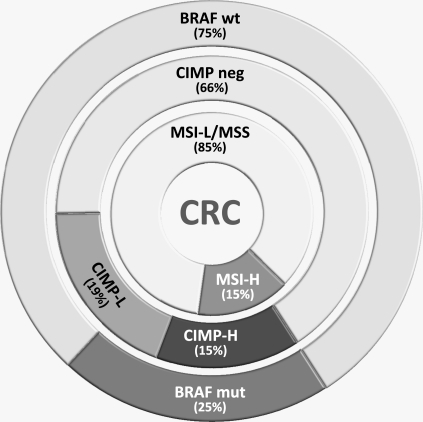Figure 1.
Molecular characterization of colorectal cancer (CRC). CRCs can be characterized by the presence or absence of microsatellite instability (MSI), the CpG island methylator phenotype (CIMP), or BRAF mutation status. Whereas BRAF mutation status is a simple categorical variable (wild type [wt] or mutant [mut]), measurements of MSI and CIMP are quantitative variables and have been characterized as “high” (MSI-H and CIMP-H, respectively) and “low” (MSI-L and CIMP-L, respectively). The analysis can vary depending on the methods used to determine MSI and CIMP. This figure is adapted from a conceptual characterization by Jass (4) with distribution data from unselected CRC patients (5,6). The work reported by Limsui et al. (7) used a cohort of middle-aged women. Variations in the distribution of tumors in these categories can be caused by technical aspects in measuring MSI or CIMP or by differences in the biology of tumors that might be present in the cohort of patients selected for study. Also, the variables are not independent because CIMP is responsible for most (but not all) of the MSI tumors and BRAF mutations are highly associated with CIMP. Cigarette smoking is best associated with those CRCs with CIMP-H, MSI-H, and BRAF mutations.

